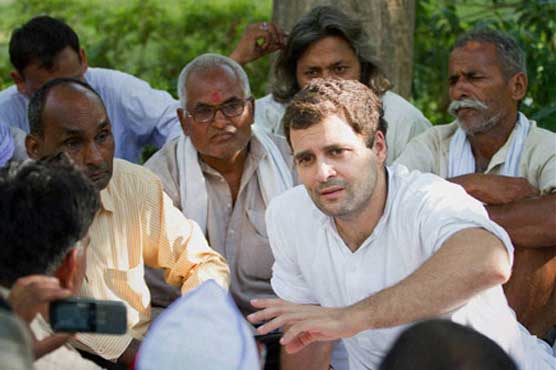Rahul Gandhi battles for seat as election end nears

Rahul Gandhi tavelled to his northern constituency in Amethi to witness voting first-hand.
AMETHI (AFP) - Rahul Gandhi, scion of India's political dynasty and frontman for the ruling Congress party, battled to defend his parliamentary seat on Wednesday as the world's biggest general election entered its final stages.
Gandhi, 43, whose lacklustre leadership of the Congress election campaign has drawn criticism, travelled to his northern constituency in Amethi to witness voting first-hand.
Standing for re-election in Amethi, the family's bastion for more than 30 years, he was easily returned to parliament in 2009 with 72 percent of the vote, but this time around some sense a change in mood.
More than 95 million voters are eligible to vote in 64 seats in the penultimate leg of the election, which ends with results on May 16. The opposition Bharatiya Janata Party (BJP) is expected to oust Congress from power after 10 years.
"Change is in the air for all to see. I too voted for change," voter Shyam Charan Gupta told AFP from Amethi in the crucial battleground state of Uttar Pradesh.
The challenge facing Gandhi was underscored this week when opposition frontrunner Narendra Modi held a rally in Amethi and declared nothing could save the dynasty.
Modi, 63, a Hindu nationalist hardliner who has campaigned on reviving the flagging economy, urged voters to "break ties with the family" that has produced three prime ministers.
Gandhi's presence in Amethi on voting day was interpreted in the local media as a sign of concern due to competition from the BJP candidate, former actress Smriti Irani, and a popular anti-corruption campaigner, Kumar Vishwas.
In March, Gandhi's campaign manager in Amethi told AFP that the former management consultant, who spends on average only one night a month in his constituency, did not plan any special campaigning for the election.
Most voters told AFP they still expected Gandhi to win, but said they would vote for him out of a sense of loyalty to the family rather than conviction in his abilities.
The constituency, a poor wheat-growing agricultural area dotted with hamlets, abounds with complaints about the poor roads and intermittent electricity, but Gandhi blames these problems on the state government.
A loss for him here or a very poor result -- after victories with 66 percent and 72 percent in 2004 and 2009 -- would deal a blow he would find it difficult to recover from.
"The fight is now for the relevance of the Gandhi family as unquestioned leaders of the Congress," Modi told the Times of India in an interview published Tuesday.
- Targeting the family -
Opinion polls show voters have turned against Congress over massive graft scandals, spiralling inflation and a sharp economic slowdown during their two terms running a left-leaning coalition government.
With Modi as the prime ministerial candidate, the BJP is expected to win the most seats in the 543-member parliament, but will likely fall short of an outright majority.
Analysts say Modi, the son of a tea-stall owner, had stepped up his attacks on the Gandhi family by appearing in Amethi as he senses victory in the five-week-long election.
"Modi wanted to hit the last nail in the coffin. His visit (to Amethi) was aimed directly at Rahul, a direct blow," Delhi-based veteran political analyst and commentator Amulya Ganguli told AFP.
Congress has ruled India for most of the period since independence in 1947 and is led by the Nehru-Gandhi clan, which includes party president Sonia Gandhi, Rahul's mother.
Sonia, Rahul and his sister Priyanka have stepped up attacks on Modi, calling him a religious fanatic who would spread divisions between the majority Hindu and minority Muslim communities if he won power.
At a rally on Tuesday, Rahul Gandhi accused the BJP and its right-wing affiliates of engineering riots before past elections to polarise votes along religious lines.
"They will only make people fight with each other, but won't talk of issues... employment, power, irrigation," he said.
Although immensely popular, Modi is seen by some as a deeply polarising figure due to his Hindu nationalist rhetoric and allegations that he failed to swiftly curb deadly 2002 anti-Muslim riots.
The riots swept Gujarat during his early years as chief minister of the prosperous western state, leaving at least 1,000 people, mainly Muslims, dead.
The BJP leader was investigated but never charged with any wrongdoing. However, many people still believe he did too little to stop the violence.
Voting is taking place Wednesday elsewhere in Uttar Pradesh, along with Bihar and West Bengal states and the Muslim-majority region of Kashmir, among others.
The final round of voting, in 41 constituencies, will take place on Monday.


